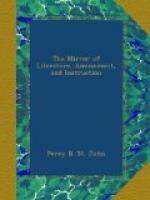The soldier’s stock of instruction was now exhausted; and when the monarch still pursued the design of unravelling the mystery, the soldier informed him he could speak no more German, but that he would answer him in his native tongue.
Here Frederick perceived the nature of the situation, at which he laughed very heartily, and advised the young man to apply himself to learning the language of Prussia, and mind his duty.
I.B.D.
* * * * *
HALF-HANGED.—ANNE GREEN.
Derham, in his Physico-Theology on Respiration, says—“The story of Anne Green, executed at Oxford, December 14, 1650, is still well remembered among the seniors there. She was hanged by the neck near half an hour, some of her friends in the mean time thumping her on the breast, others hanging with all their weight upon her legs, sometimes lifting her up, and then pulling her down again with a sudden jerk, thereby the sooner to dispatch her out of her pain, as her printed account wordeth it. After she was in her coffin, being observed to breathe, a lusty fellow stamped with all his force on her breast and stomach, to put her out of her pain; but, by the assistance of Dr. Piety, Dr. Willis, Dr. Bathurst, and Dr. Clark, she was again brought to life. I myself saw her many years after, after she had (I heard) borne divers children. The particulars of her crime, execution, and restoration, see in a little pamphlet, called News from the Dead, written, as I have been informed, by Dr. Bathurst (afterwards the most vigilant and learned President of Trinity College, Oxon), and published in 1651, with verses upon the occasion.”
P.T.W.
* * * * *
ENIGMATICAL REPLIES.
A pleasant young fellow, about half-seas-over, passing through the Strand at a late hour, was accosted by a watchman, who began with all the insolence of office to file a string of interrogatories, in the hope of being handsomly paid for his trouble.
“What is your name, sir?”—“Five Shillings.”
“Where do you live?”—“Out of the king’s dominions.”
“Where have you been?”—“Where you would have been with all your heart.”
“Where are you going?”—“Where you dare not go for your ears.”
The officious guardian of the night thought these answers sufficient to warrant him to take the young man to the watch-house. The next morning, on being brought before the magistrate, he told his worship, “that as to the first question, his name was Thomas Crown; with regard to the second, he lived in Little Britain; with respect to the third, he had been drinking a glass of wine with a friend; and that as to the last,” said he, “I was going home to my wife.” The magistrate reprimanded the watchman in severe terms, and wished Mr. Crown a good morning.—I.B.D.




